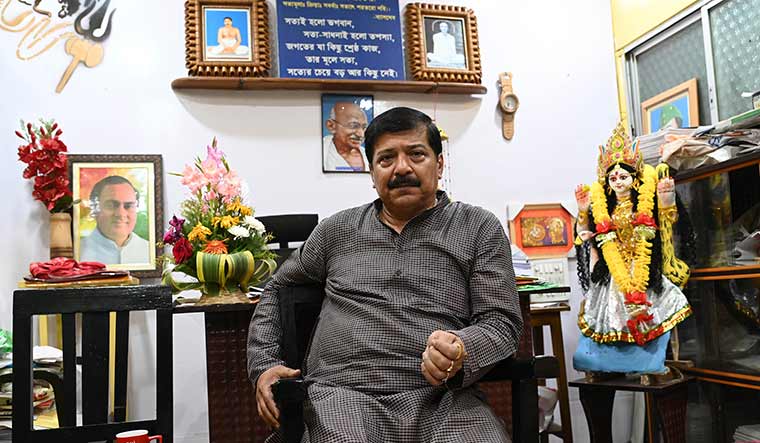THE Congress office in Agartala seemed to have more portraits than people. Indira Gandhi, Rajiv and Sonia looked down from the walls. Inside, there was a big photo from Rahul’s Bharat Jodo Yatra. State president Birajit Sinha and other leaders were campaigning in north Tripura. A lone worker was enjoying a siesta in Sinha’s office. When I shouted a greeting, he groggily responded: “There is no one here, you can go now.”
The Congress is only contesting 13 out of the 60 seats in Tripura―a historic low. In the other seats, it is supporting the Communist Party of India (Marxist). Both parties have said that it is more of a “seat adjustment” than an alliance―there would be no joint campaign or manifesto. But, neither party would seek votes against the other. The aim is to avoid “the split of opposition votes”.
Sudip Roy Barman, Congress MLA from Agartala, said the arrangement was at the behest of the party’s central leadership and against the wish of local leaders. He said he was disappointed that they were given only 13 seats, but added that local leaders understood the logic, in the context of the 2024 general elections. Ultimately, he said, “the most important thing is to boot out this BJP government from the state”.
More than the alliance, the Congress cadre is unhappy that the northeast was not part of the Bharat Jodo Yatra. Leaders are facing tough questions, especially in light of Prime Minister Narendra Modi’s robust northeast policy. Barman said he had taken up the matter with Rahul and had been assured that there would be “some kind of padyatra” in poll-bound states. Barman is not concerned about the failure of the CPI(M)-Congress alliance in West Bengal because Tripura’s “population spread is different”.
Siraj Ali, former minority morcha chief of the BJP, who has left the party, said that the alliance had a good chance. “It will mainly work because there will not be a joint campaign and there will be no sabotage,” he said. Ali said that scheduled castes, other backward castes and tribals would swing in favour of the alliance.
Ali, an advocate practicing in the Tripura High Court, said that the Tipra Motha, the new party launched by titular king Pradyot Manikya Debbarma would do well, except in the seats where Chakma and Reang communities were prominent.
“They are, historically, anti-royal,” he said. “If the Tipra Motha and the CPI(M) had become allies, then the Chakma and Reang votes―mostly Christian―would have gone to the BJP. Now, these votes could go to the CPI(M).” Ali even said that the situation is such that the “communists might get a majority on their own”.
But, political observer Sekhar Dutta has a different opinion. “I think the BJP is poised to get at least some of their (Chakma and Reang) votes,” he said. Dutta said it would be a close election, but with a slight edge to the BJP because of its machinery.
Meanwhile, urban voters are keen to keep the CPI(M) out of power after its previous 25-year rule. Rural voters are divided and mostly silent. Prasenjit Das of Sepahijala district, however, voiced his concerns: “How can we forget the long, torturous regime of the CPI(M)? We see the Congress joining them. So how can we vote for either?”


